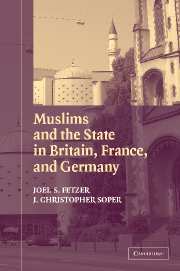Book contents
- Frontmatter
- Contents
- List of Figure and Tables
- Preface
- 1 Explaining the Accommodation of Muslim Religious Practices in Western Europe
- 2 Britain: Establishment Religion and Islamic Schools
- 3 France: Laïcité and the Ḥijāb
- 4 Germany: Multiple Establishment and Public Corporation Status
- 5 Public Attitudes toward State Accommodation of Muslims' Religious Practices
- 6 Integration and Muslim Practice
- Appendix: Survey Characteristics
- Glossary of Non-English Terms
- Bibliography
- Index
6 - Integration and Muslim Practice
Published online by Cambridge University Press: 05 September 2012
- Frontmatter
- Contents
- List of Figure and Tables
- Preface
- 1 Explaining the Accommodation of Muslim Religious Practices in Western Europe
- 2 Britain: Establishment Religion and Islamic Schools
- 3 France: Laïcité and the Ḥijāb
- 4 Germany: Multiple Establishment and Public Corporation Status
- 5 Public Attitudes toward State Accommodation of Muslims' Religious Practices
- 6 Integration and Muslim Practice
- Appendix: Survey Characteristics
- Glossary of Non-English Terms
- Bibliography
- Index
Summary
Those who believe, and suffer exile and strive with might and main, in the cause of Allah, with their goods and their persons, have the highest rank in the sight of Allah: they are the people who will achieve [salvation].
qur'᾽ān 9:20It is ridiculous for any person to profess himself to be a Mahometan only in his religion, but in everything else a faithful subject to a Christian magistrate, whilst at the same time he acknowledges himself bound to yield blind obedience to the Mufti of Constantinople, who himself is entirely obedient to the Ottoman Emperor and frames the feigned oracles of that religion according to his pleasure.
John Locke (1990 [1689]), A Letter Concerning TolerationThe same questions which were put to the Jews for decades, if not centuries, have arisen among Muslims as to the authenticity of their belonging. Are they members of the umma whose order they are completely bound by or rather true citizens of the state in which they live, bound, as all other citizens, by its constitutions and laws? What are they first: Muslim or British, French, German, or Spanish? In such a situation, the point is plain: are the so-called European-Muslims trustworthy?
Muslim theologian Tariq Ramadan (1999b:162)Determinants of State Accommodation for Muslims
our country comparisons suggest that states follow no single model in accommodating Muslims' religious practices, but that church–state institutions in each nation significantly structure the political debate.
- Type
- Chapter
- Information
- Muslims and the State in Britain, France, and Germany , pp. 146 - 158Publisher: Cambridge University PressPrint publication year: 2004



